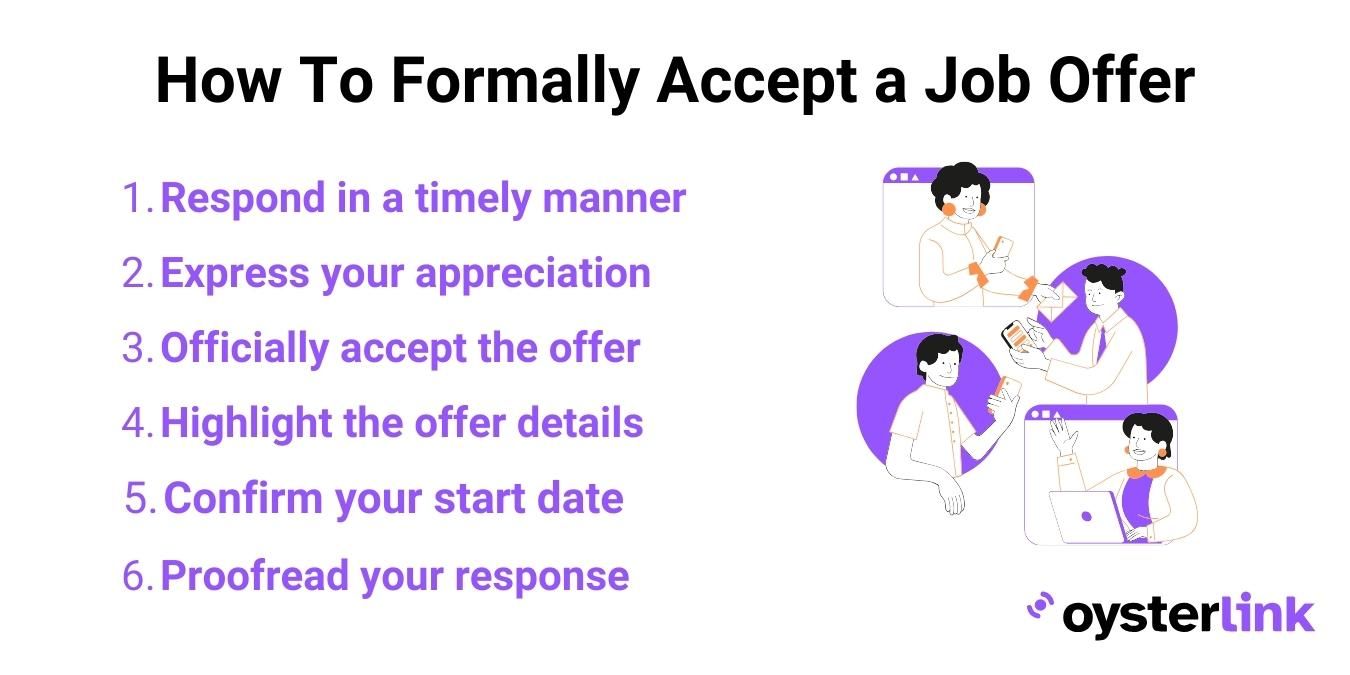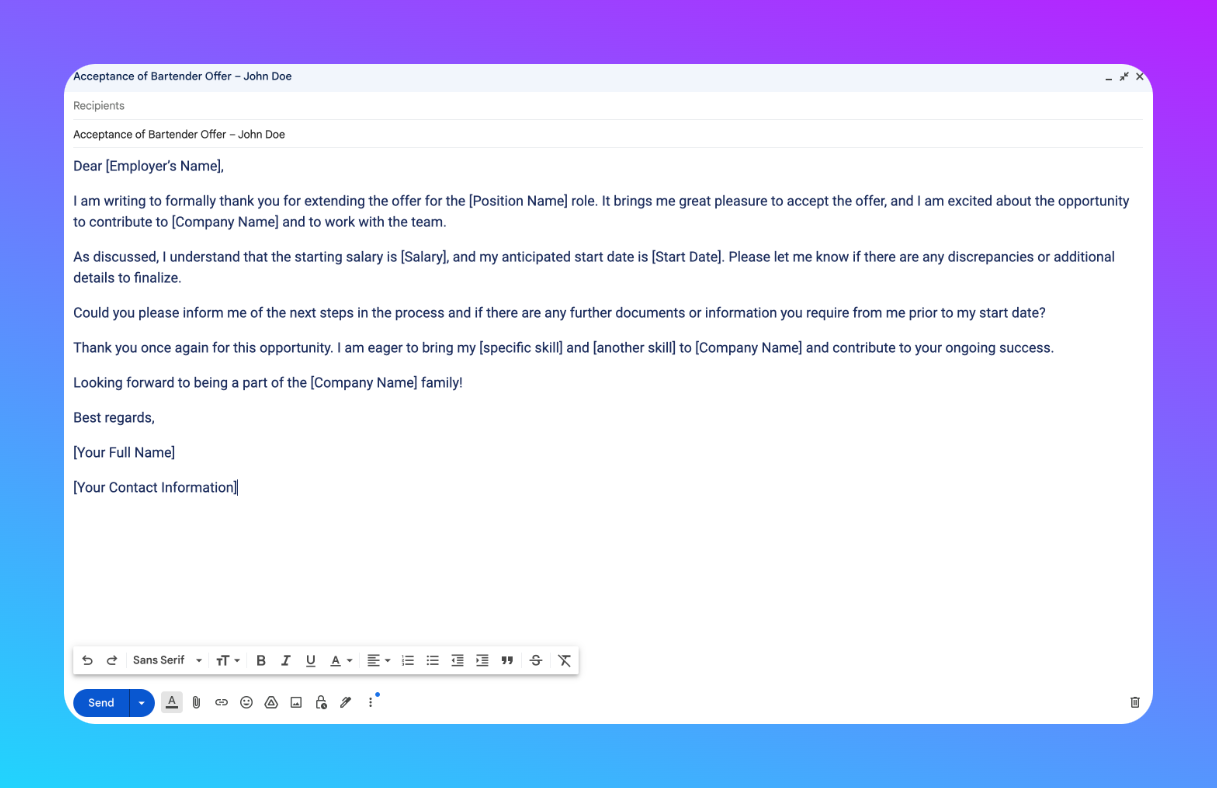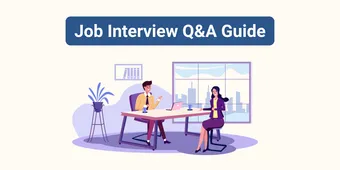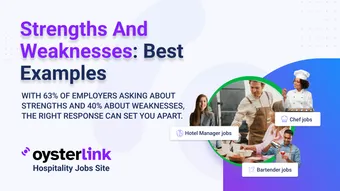How to Accept a Job Offer: Key Takeaways
- Review before you accept the job offer: Carefully evaluate salary, benefits, responsibilities, and company culture to ensure the role aligns with your career goals.
- Respond to the job offer with professionalism: Accept promptly, express gratitude, confirm the details in writing, and clarify your start date and next steps.
- Plan your transition: After acceptance, close out other applications, submit your resignation if needed, and prepare yourself to start your new role smoothly.
It’s no secret that it’s a competitive job market out there. On average, each job offer attracts 250 candidates. Out of those who submitted their resume, 4 in 6 will get called for an interview, and only one will get the job.
The odds can be overwhelming, but here's some great news — You've successfully completed the hiring process and landed a job offer.
After thoughtful consideration and weighing both the pros and cons, you’re ready to say “yes.”
But how exactly should you accept a job offer?
In this guide, we’ll walk you through the steps to help you accept the job with grace and professionalism and cover email templates you can pull inspiration from.
What To Do Before Accepting a Job Offer
Congratulations, you landed the job! Navigating through the application and interview process is no small feat, and receiving a job offer is a significant milestone you should celebrate.
Before accepting a job offer, it is key to perform a thorough evaluation to ensure the role, company and terms align with your career goals, values, and needs.
Here is a step-by-step process of what you should do before accepting a job offer:
- Evaluate the job offer: Ensure the salary is competitive and aligns with your work experience and skills. In addition, examine the benefits being offered, such as insurance coverage, retirement plans, paid time off and sick days.
- Assess job responsibilities: Make sure the role matches your career goals and offers opportunities for professional growth and advancement. Accepting a role that aligns with your aspirations and skills is an invaluable tool for long-term job satisfaction and career development.
- Analyze company culture: Evaluate the company’s work environment, values and principles, as it can help foster a sense of belonging, respect and fulfillment, contributing to higher job satisfaction and productivity.
- Clarify the job details: Confirm the expected work hours for the role, workload, the possibility of remote work and any travel requirements needed to help you set expectations and plan your personal life around your work commitments.
- Negotiate the offer: If the offered salary does not meet your expectations, you can negotiate the salary by presenting a counteroffer backed by market research on typical salaries for similar roles in your location.
- Review the employment contract: Carefully read all the terms and conditions in the contract, including probationary periods, termination notice requirements and non-compete clauses. You can also consider having a legal professional review the contract to ensure that everything discussed during the negotiation is included.
- Get everything in writing: Ensure that you receive a formal offer letter detailing all the agreed terms including salary, benefits, pay raises and job responsibilities. Any special arrangements or agreements (think flexible work hours or working off the clock) made during the negotiation process should be documented in writing to avoid future misunderstandings.
How To Formally Accept a Job Offer
Here’s a detailed guide to help you accept a job offer with professionalism:

- Respond in a timely manner: Once you decide to accept the job offer, respond as soon as possible — around one to two days after you receive the offer.
- Express your appreciation: Begin your response by expressing your gratitude. Thank the employer for the opportunity and express your enthusiasm about joining the company.
- Officially accept the offer: Clearly state your intent to accept the position. Be concise and positive. For example, you can say, “I am pleased to accept the offer for [Position Name] and I’m excited to become a part of the team.”
- Highlight the offer details: Reiterate the key terms of your employment, including the position title, salary and other relevant details. This ensures that both parties are on the same page about the employment terms.
- Confirm your start date: Clarify your start date to set clear expectations and prevent scheduling conflicts.
- Ask for the next steps: Inquire about the next steps you need to take before starting the role, such as completing paperwork or undergoing a background check.
- Proofread your response: Before sending your acceptance email, thoroughly proofread your response to ensure it is free of errors and conveys your message clearly and professionally.
What To Say When Accepting a Job Offer [Email Templates]
When accepting a job offer, it’s important to communicate your decision clearly and enthusiastically. Below are two examples illustrating how you can accept a job offer:
Example 1: Formal Acceptance Letter
Subject: [Your Name] - Acceptance of the [Job Title] Position
Dear [Employer's Name],
I hope this message finds you well. I am delighted to formally accept the offer for the [Job Title] position at [Company Name]. I am very excited about the opportunity to join your team and contribute to [a specific project, task, or general company success].
I understand the terms of the offer as follows:
- Start Date: [Start Date]
- Salary: [Salary]
- Benefits: [Details of any discussed benefits]
If there are any other details to finalize, or any additional information or documents you require from me, please let me know. I am keen to complete any necessary formalities to ensure a smooth onboarding process.
Thank you again for this wonderful opportunity. I am eager to start and am looking forward to contributing to [Company Name].
Best Regards,
[Your Full Name]
[Your Contact Number]
[Your Email Address]
Example 2: Enthusiastic Acceptance Letter

Subject: Acceptance of [Job Title] Offer - [Your Name]
Dear [Employer's Name],
I am writing to formally thank you for extending the offer for the [Position Name] role. It brings me great pleasure to accept the offer, and I am excited about the opportunity to contribute to [Company Name] and to work with the team.
As discussed, I understand that the starting salary is [Salary], and my anticipated start date is [Start Date]. Please let me know if there are any discrepancies or additional details to finalize.
Could you please inform me of the next steps in the process and if there are any further documents or information you require from me prior to my start date?
Thank you once again for this opportunity. I am eager to bring my [specific skill] and [another skill] to [Company Name] and contribute to your ongoing success.
Looking forward to being a part of the [Company Name] family!
Best regards,
[Your Full Name]
[Your Contact Information]
What To Do After Accepting a Job Offer
Now that the ink has dried on your job offer, it’s time to navigate the next steps with grace and precision, ensuring your transition into your new role is seamless.
- Close the loop on other job applications: Notify other companies where you have pending job applications or job offers and express your appreciation for their consideration. This helps maintain positive relationships and leaves the door open for future opportunities.
- Sign documents from your new employer: After formally accepting the offer, your new employer will send over official employment documents, such as the contract and benefits package, for you to review and sign. Read these documents carefully and ensure all details are correct.
- Clear the final steps: Complete any remaining requirements, including reference conversations, background checks and medical exams. Promptly provide any additional information or documents that the employer requests to prevent delays in your state.
- Submit your notice of resignation to your current employer: If you are currently employed, submit a formal resignation letter to your current employer to leave your position with grace. It is standard practice to provide two weeks’ notice, but refer to your employment contract for any specific notice period requirements.
- Settle logistical details: If you are relocating for your new role, start making moving arrangements. On the other hand, if you are working remotely, ensure you have a suitable home office setup that will keep you productive, even when working at home.
- Reflect on your career goals and expectations: Consider what you want to achieve in this new role and what your expectations are. Having clear goals can help you stay focused and motivated as you embark on your new career journey.
- Keep your network informed: Let your professional network know about your career move by updating your professional social media profiles with your new position and company. This can help keep your network in the loop of your professional progress.
- Prepare for your new role: Before you start your new role, research and gather as much information as you can about your new role. Familiarize yourself with any skills or knowledge that will help you excel in your new position.







Loading comments...